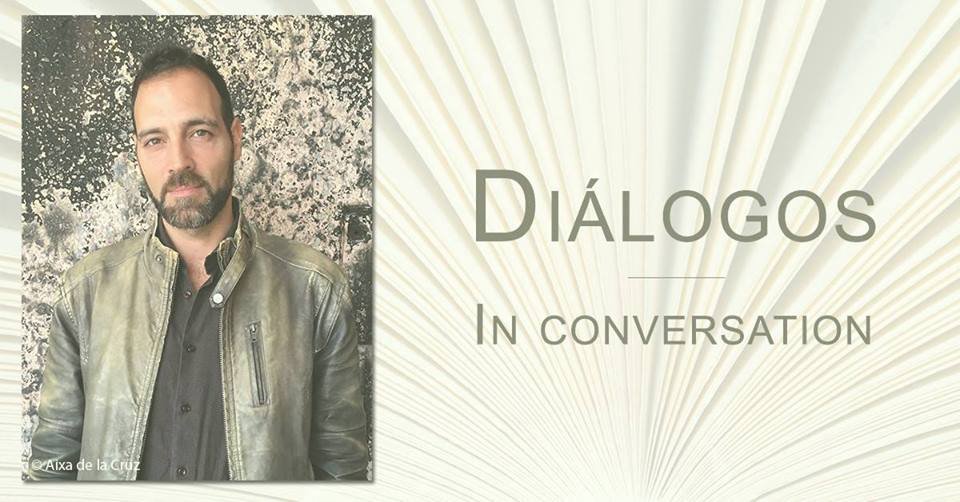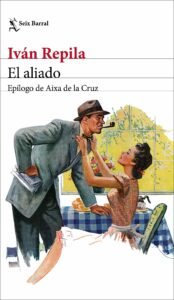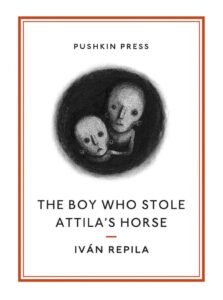“In Conversation” with Iván Repila

 On the 28th of February, Instituto Cervantes Dublin is kicking off the new series “In Conversation” that features talks with contemporary Spanish authors about their works. The events are designed to give an insight into current affairs in Spain as well as in Ireland. The first session’s guest is writer Iván Repila whose books have been critically acclaimed and translated into several languages. His latest work is called the “The Ally” and deals humorously with feminism and the part men play in it. The author will be in conversation with UCD lecturer Pascale Baker. Babylon Radio went and talked to the Assistant Professor about Thursday’s talk.
On the 28th of February, Instituto Cervantes Dublin is kicking off the new series “In Conversation” that features talks with contemporary Spanish authors about their works. The events are designed to give an insight into current affairs in Spain as well as in Ireland. The first session’s guest is writer Iván Repila whose books have been critically acclaimed and translated into several languages. His latest work is called the “The Ally” and deals humorously with feminism and the part men play in it. The author will be in conversation with UCD lecturer Pascale Baker. Babylon Radio went and talked to the Assistant Professor about Thursday’s talk.
What is “In Conversation” about and what is the aim?
Pascale Baker: “The aim is to get authors or cultural speakers from different parts of the Hispanic world or Spain to talk about their work and to promote it to the general public. Not just people from Spain but anyone who is interested in Hispanic culture. And the event on Thursday is organized because Iván Repila, the author that’s invited, is becoming very famous actually. He has several of his books translated into English and other languages and he just published another one a couple of months ago called “the Ally” which is a very topical Book. The aim of this particular session on Thursday is to present new authors, new writers to the public so that people realize that Spanish literature is not just canonical writers but that there’s actually a lot of upcoming talent as well.”
 It is also supposed to give an insight into the connection between Spain and Ireland. What is the connection in the book?
It is also supposed to give an insight into the connection between Spain and Ireland. What is the connection in the book?
Pascale Baker: “A lot of the issues Iván writes about in his novels can be applied to Ireland as well and to all countries. For instance, his latest one, “the Ally”, has been much praised because it ties in with the movement across the world for greater gender equality particularly for women that’s the reason of movements such as #MeToo and the 8 M Movement in Spain. And obviously, that applies to Ireland as well because Ireland recently passed the 8 amendment that would allow abortion in some circumstances. So I think that the fight for women’s rights and the part that men play in it is something that’s relevant to Ireland as well as all of the world. I think Iván’s works are really quite universal and somebody reading them in Ireland could see that it relates to them as well and not just kind of set around Spanish themes.”
How important is literature in the Spanish and Irish discourse?
Pascale Baker: “I think literature is very important. Iván has said in interviews that he feels that literature can start a social revolution and can plant the seed in somebody’s mind which can then make them think about something quite differently. And if that happens with enough people then that can really start to change things in the world and I think that that applies in Ireland as well Literature seems quite possibly a push or measures social change that is happening in society.”
How does his work represent the social change?
 Pascale Baker: “Irish readers would recognize many of the issues Iván is raising in their own country. Women’s rights, gender equality, gender rights, the struggle for that, the role that men play in that. I think it’s pretty universal from what I’ve seen. They’re quite harsh works in some respects. Another work that he wrote that was translated into English is “The Boy Who Stole Attila’s Horse” which is an earlier work, from 2013. It’s been reviewed quite a lot in Ireland which is about two boys in a well. They are put there and they can’t get out it’s presumed they will starve to death but they are trying to get and start some sort of revenge or social revolution. So I think in terms of Ireland these novels really can resonate as a country that has undergone a lot of social change recently, that’s moving in a different direction that’s modernized so I think that’s maybe where Irish readers might see some sort of synergy or kind of recognize some of the issues that Iván is raising.”
Pascale Baker: “Irish readers would recognize many of the issues Iván is raising in their own country. Women’s rights, gender equality, gender rights, the struggle for that, the role that men play in that. I think it’s pretty universal from what I’ve seen. They’re quite harsh works in some respects. Another work that he wrote that was translated into English is “The Boy Who Stole Attila’s Horse” which is an earlier work, from 2013. It’s been reviewed quite a lot in Ireland which is about two boys in a well. They are put there and they can’t get out it’s presumed they will starve to death but they are trying to get and start some sort of revenge or social revolution. So I think in terms of Ireland these novels really can resonate as a country that has undergone a lot of social change recently, that’s moving in a different direction that’s modernized so I think that’s maybe where Irish readers might see some sort of synergy or kind of recognize some of the issues that Iván is raising.”
What will the talk on Thursday focus on?
Pascale Baker: “It’s gonna be an introduction to Iván and his work and the themes that unite his works. Leading us from there, asking about how to write, his creative process gives people the idea what Spanish literature can be. We’re also gonna talk about his work obviously ”The Boy Who Stole Attila’s Horse” which has been translated into English and probably has been read by some of the audience as well. It’s quite a shocking work, this idea of a social revolution. One of his other works, particularly “The Ally” is about feminism. Basically, that book is about a guy who becomes a feminist but it actually has a lot of contradictions and he has to confront the contradictions to become a feminist. It has a lot of questions such as is it possible for him to become a feminist and how can men help within the movement. It’s very kind of socially relevant themes that are going to be discussed as well. Also, we are gonna ask him general questions about his work because it’s very socially and politically engaged. And, if you feel that it’s possible for literature to be socially and critically engaged and also have a certain entertainment value. Furthermore, we ask questions about his works. For instance, “The Boy Who Stole Attila’s horse” has been described as a fairytale which is interesting. So I’d like him to discuss a little bit more about whether that’s a true description of it. He is also gonna do a few readings from “The Boy Who Stole Attila’s horse” and also from his recent work “The Ally”.”
Where: Instituto Cervantes Dublín – Auditórium, Lincoln House, Lincoln Place, Dublin 2
When: 6pm to 9pm
How much: Admission free, booking recommended